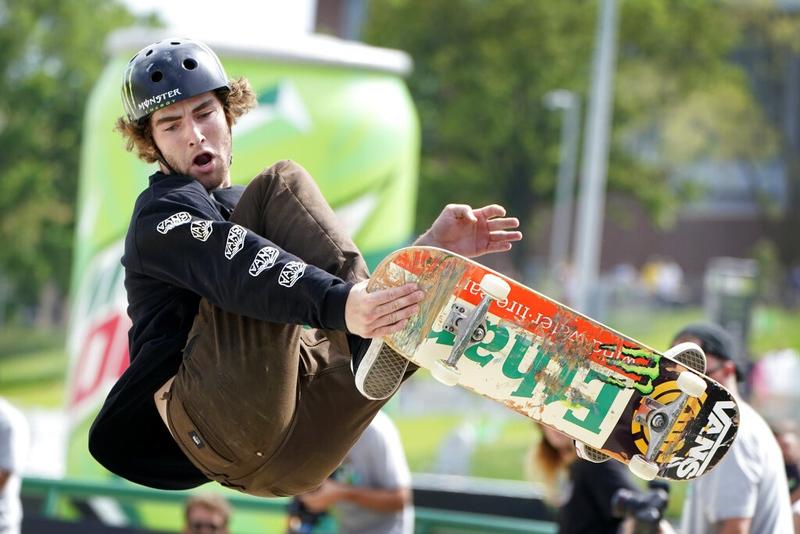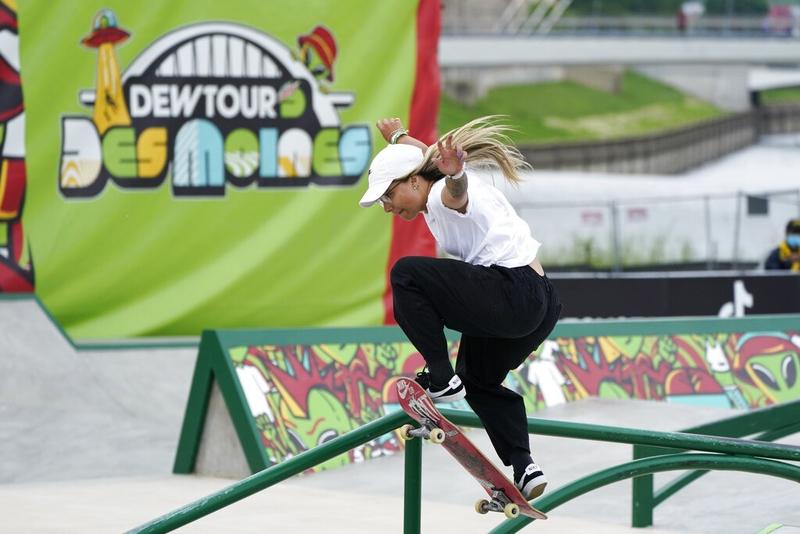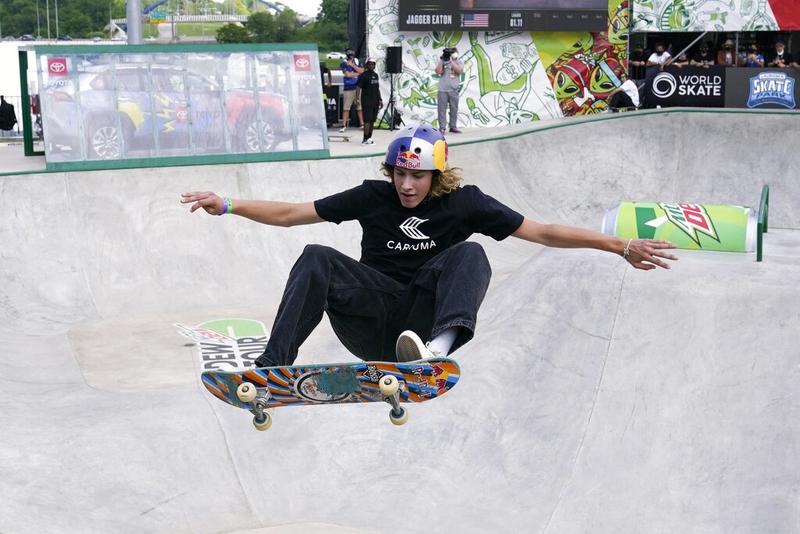 Thomas Schaar shows off his moves in the park event during an Olympic qualifier in Des Moines, Iowa on May 23, 2021. (PHOTO / AP)
Thomas Schaar shows off his moves in the park event during an Olympic qualifier in Des Moines, Iowa on May 23, 2021. (PHOTO / AP)
The hotel door opens and, fast as that, the sound of polyurethane clicking across concrete begins. The rhythmic grrrr-chk-chk-grrrr-chk-chk-grrrr-chk-chk sound of wheels scooting over cracks in the sidewalk is a telltale sign that something is different in Des Moines.
If the Olympics might be viewed as offering some sort of mainstream seal of approval to a once-rebellious sport, what's left to be seen is whether the five rings will keep it fun or suck the life out of it
Skateboarders took over Middle America last week. It's a dress rehearsal for this summer, when they'll bring their show to the rest of the world at the Olympics.
The questions under the magnifying glass at this week's Dew Tour-one of the last major qualifying events for the Tokyo Games in July-are whether the Olympics is ready for skateboarding and, more tellingly, whether skateboarding is ready for the Olympics.
"That's the beautiful thing about skateboarding," said Mariah Duran, a 24-year-old from Albuquerque, New Mexico, who is one of a handful of US medal hopefuls. "It takes you places you've never been."
ALSO READ: Riders ramp up China's scene
More than 20 years after its wintertime cousin, snowboarding, reluctantly took to the biggest stage in sports, skateboarding is grinding its way into the much more crowded summer program. It's one of a number of attempts by the International Olympic Committee-surfing, rock climbing and 3-on-3 basketball are also debuting in Tokyo-to appeal to a younger, trendier, more easily distracted audience.
Whether any of this is truly "saving" the Olympics for the next generation is a matter of opinion. Viewership numbers-many proprietary, most skewed by the online fragmentation of the audience and all of them open to manipulation to tell whatever story might fit the narrative-indicate the Games still have issues with the in-demand 18-to-34 market. (That puts them in good company: The NFL and MLB and pretty much anything aired on TV are also doing worse in that demographic over the past decade.)
Regardless of whether either side enjoys a boost from this new partnership, suffice to say that none of it would've happened without the 1998 introduction of snowboarding to the Olympics. Despite its now-veteran status in the Games, the so-called shredders still get treated like the shiny new thing on the shelf every four years. And while the entire sport has prospered over the two decades, snowboarding has delivered only two athletes the average person might recognize on the street: Shaun White and Chloe Kim.
But lots of folks just beneath that level-Jamie Anderson, Red Gerard, Danny Davis and others-have made very good livings, as well. All of which has been enough to woo a big chunk of skateboarding's elite into the Olympics without much hand-wringing.
"We're like surfing or snowboarding, in that the competitors were pretty reluctant to join into something like that," said one of skateboarding's forefathers, 50-year-old Mike Vallely, who helped call the action in Iowa.
 Pamela Rosa rides the rails in the street event at the Olympic qualifier in Des Moines on May 23, 2021. (PHOTO / AP)
Pamela Rosa rides the rails in the street event at the Olympic qualifier in Des Moines on May 23, 2021. (PHOTO / AP)
"But once Shaun White started having this great success, the kids coming up started seeing that as what is possible."
Another conversation that enveloped snowboarding back in the day was whether competing for cash and fame fit into the overall ethos of the "lifestyle" sport that snowboarding wanted to be-a sport that valued fun and filming as much as money and medals. Skateboarders deal with that issue, as well, and some are just as good at threading that needle.
"You look at snowboarding and the way it is now, and I know they love to compete," said 20-year-old Jagger Eaton, who is trying to qualify in both the park and street events being showcased at the Games. "But they've also always loved being out on the (backcountry), and going out and filming projects. And they've shown they can do both."
Dashawn Jordan, who is also aiming for Tokyo, reckons both sides of the sport can co-exist. "I was introduced to skateboarding through the competitive side," he said. "And then I found out a lot about what the other side of the sport looks like. I look at all the amazing people who try really hard to keep both factors in play."
The most successful athlete in the current-day group is American Nyjah Huston, a 12-time X Games and five-time world champion who, in a sign of where the soul of this sport has already moved, includes a shoe deal with Nike among his cache of endorsements.
"I never put much thought into it being in the Olympics," Huston said. "I was always confused about why it wasn't in there, but at least it's in there now, and I'm hyped for it."
There's also Sky Brown, the 12-year-old competing for her father's home country of Britain who spent about half her time growing up in Japan, her mother's native country and the place where all the action is happening this summer. She also surfs and recently starred in, and won, TV show Dancing With The Stars: Juniors.
As mass marketable as it might be, skateboarding still has some hurdles to climb. In Japan, skateboarding in broad daylight on a busy street is still frowned upon. It's not all that much different in some places in the United States.
"We didn't start out as hoodlums or bad guys, but we came up against so much resistance and oppression," Vallely said. "It spurred two different things. We wanted to promote skating, but also, there was pushback, and we weren't afraid to say, 'No, we're not going take this."
 Jagger Eaton, pictured competing in Des Moines, is confident that skateboarding's Olympic inclusion will benefit the sport. (PHOTO / AP)
Jagger Eaton, pictured competing in Des Moines, is confident that skateboarding's Olympic inclusion will benefit the sport. (PHOTO / AP)
Josh Friedberg, the CEO of USA Skateboarding, dates some of this attitude back to a Life Magazine cover in 1965 that featured a girls' national champion doing a handstand on a board, next to the headline: "The craze and the menace of skateboards."
"It was immediately cast as something that's not good, and that carried on in different iterations through every decade," Friedberg said.
READ MORE: Skateboarders' pipe dreams hit pandemic-sized problems
If the Olympics might be viewed as offering some sort of mainstream seal of approval to a once-rebellious sport, what's left to be seen is whether the five rings will keep it fun or suck the life out of it. Even two decades later, that is a debate they're still having about the superpipe in snowboarding.
However their show plays in Tokyo, skateboarders feel pretty good about their place in the sports world these days.
Des Moines spent more than a decade trying to get America's largest open skate park built. The venue opened this week for the Dew Tour. Leaders in the sport think the Olympics make it easier to build more like this in the future.
"I never needed the Olympics to justify skateboarding for me," Vallely said. "But I sure get a lot of phone calls now. They see it's in the Olympics and they know I was involved in all this. I feel like I did some good work."


